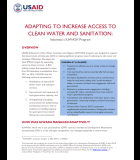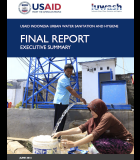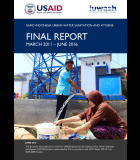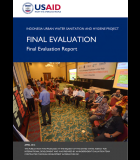Indonesia Urban Water and Sanitation Hygiene (IUWASH)
Urban areas across Indonesia have reached a critical juncture. Despite high levels of economic growth, access to basic services such as water supply and sanitation services are exceptionally low, especially for the urban poor. Only 37 percent of urbanites have access to piped water supply and only 69 percent have access to the most basic sanitation. Most notably, coverage in several areas is falling even further behind as urban population growth outstrips the ability of most local governments to expand service coverage.
The USAID Indonesia Urban Water, Sanitation and Hygiene (IUWASH) Project was a five-year effort designed to support the Government of Indonesia (GOI) in making significant progress towards achieving its safe water and sanitation Millennium Development Goal (MDG) targets by expanding access to these services.
USAID/Indonesia followed up the project starting in 2016 with the Indonesia Urban Water, Sanitation and Hygiene Penyehatan Lingkungan untuk Semua project (IUWASH PLUS).
Activity Description
Demand for safe drinking water and improved sanitation mobilized among urban communities and households with currently unimproved access. The program activities stimulated demand from both civil society and local governments for improved and increased water supply and sanitation services, which included making service providers more accountable to the citizens they serve and the local government owners. IUWASH’s approach to achieve this result was to give a voice to hidden demand, and to mobilize demand for improved sanitation by creating service demand where previously none existed. The capacity to sustainably met this mobilized demand with improved water and sanitation services built among the public and private sector institutions best placed to provide these services in urban areas. The water and sanitation sector was facing several challenges, including poor management, insufficient funding, and operational inefficiencies. To address these issues, IUWASH increased the capacity of key institutions including the local government, PDAM, civil society, SMEs, and community groups.
A governance and financial-enabling environment supported equitable access to safe drinking water and improved sanitation in urban areas. Facilitating an improved enabling environment for water and sanitation services involved the active participation of local government and parliaments as the owners of water utilities. Recent Indonesian Government programs to improve sanitation also depended on local governments to lead the development and implementation of citywide sanitation plans that support household, community-based, and centralized solutions in accordance with citywide objectives.
Expected Outcomes
- Two million people in urban areas gain access to improved water supply as a result of US Government assistance;
- 200,000 people in urban areas gain access to improved sanitation facilities as a result of US Government assistance; and
- The per-unit water cost paid by the poor in targeted communities’ decreases by at least 20% through more participatory, transparent, accountable, and financially enabled services.
- Increased demand for safe drinking water access and improved sanitation among urban communities and households with currently unimproved access;
- Improved water and sanitation services provided by public and private sector institutions in urban areas where there is sufficient sustainable capacity to meet increased demand; and
- Improved governance and finances that create an enabling environment supporting equitable access to safe drinking water and improved sanitation in urban areas.
Actual Outcomes
- The number of people that gained access to improved water supply reached 2,246,005 (as of September 2015).
- The number of people that gained access to improved sanitation services reached 256,055
- The per unit water cost paid by poor in targeted communities decreased by 53%
- The number of participants in IUWASH-sponsored trainings reached 97,791





